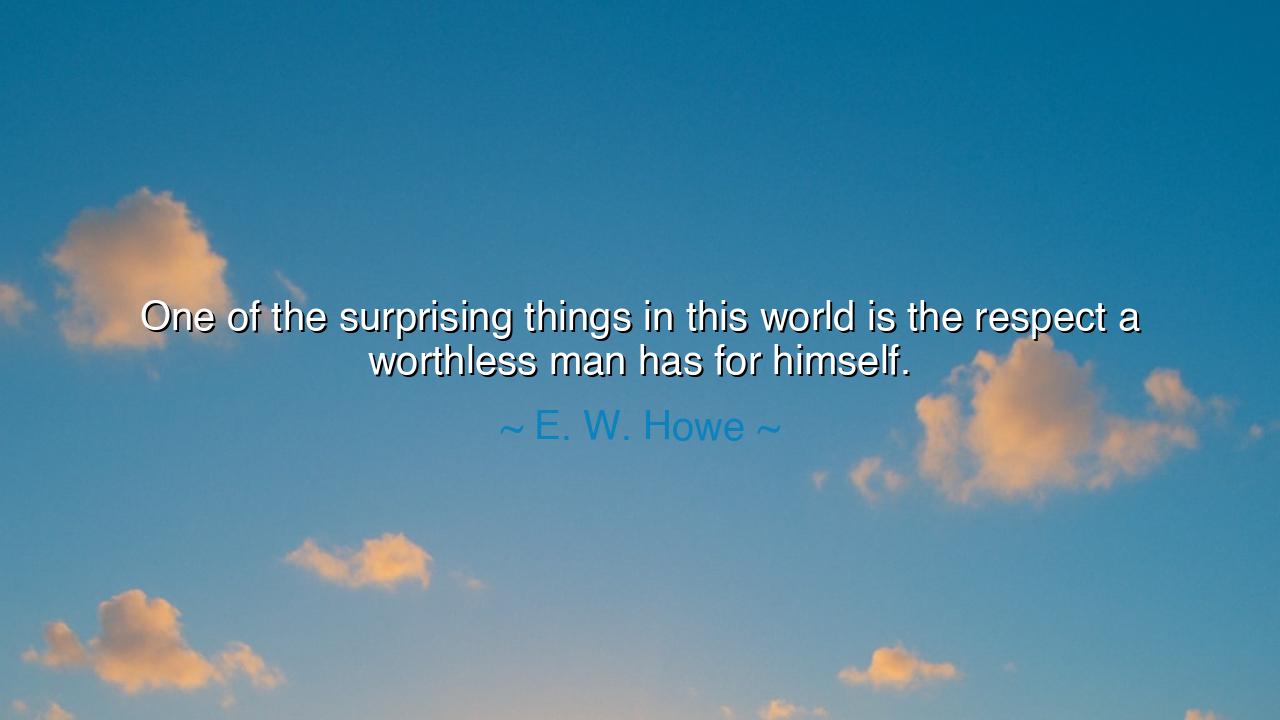
One of the surprising things in this world is the respect a
One of the surprising things in this world is the respect a worthless man has for himself.






Hear, O seekers of wisdom, the words of E. W. Howe, the American editor and philosopher of plain speech, who declared: “One of the surprising things in this world is the respect a worthless man has for himself.” In this sharp utterance lies both irony and lament, for Howe saw with clear eyes how often men of no virtue, no labor, and no sacrifice carry themselves with pride greater than kings. He points to a paradox of the human heart: that those who have accomplished little often carry the most inflated image of themselves, while those who have given much walk humbly.
The origin of this saying rests in Howe’s life as a newspaperman and observer of ordinary folk. He was known for his wit, piercing insight, and unflinching commentary on human vanity. He saw men who contributed nothing of substance to their families or communities, yet who demanded honor, praise, and deference. To him, this false self-respect was not only laughable but tragic, for it revealed how far men could drift from true humility and honest reckoning. His words endure because the condition he describes is not bound to his century, but to all ages.
Consider, O listener, the figure of Alcibiades of Athens, brilliant in speech and appearance, yet reckless and destructive in action. He betrayed allies, changed loyalties, and endangered his city, yet carried himself with immense pride. Many revered him for his charm, but the wise saw in him the truth of Howe’s words: a man who in substance was dangerous and unworthy, yet who held himself in high respect. Meanwhile, men like Socrates, who gave his life for truth, lived humbly and without pretense. Thus, history itself is filled with “worthless men” exalted in their own minds, and noble men who carried themselves with modesty.
This saying also reveals a deeper truth about the nature of pride. Pride, when unearned, is a mask that hides emptiness. The “worthless man” clings to respect for himself because it is all he has; he cannot point to deeds, to service, to sacrifice. His pride becomes inflated, brittle, and hollow. Yet because he believes so firmly in his own worth, many around him may even be deceived. Howe warns us not to be fooled by such hollow confidence, for the appearance of dignity is not the same as its reality.
Let us also recall the example of Marcus Aurelius, emperor of Rome. He held the might of the world in his hand, yet wrote in his Meditations that he was but a man, soon to return to dust. This is the opposite of Howe’s “worthless man”: one who had every reason to exalt himself, yet chose humility. From this contrast we learn that true greatness rarely boasts, while false greatness is loud and self-congratulatory. It is indeed surprising, as Howe notes, how often worth and humility are paired, while worthlessness and arrogance walk hand in hand.
O children of tomorrow, take this teaching into your hearts. Do not measure men by the respect they show themselves, but by the deeds they give to the world. Be wary of those who speak constantly of their own greatness, for they often seek to hide their emptiness. Look instead to the quiet ones, who labor without recognition, who give without boasting. Their humility is the sign of true worth, and their silence speaks more loudly than the proud man’s endless words.
Practically, let this wisdom shape your own path. Do not deceive yourself with hollow pride. Ask daily: “What have I given to others? What have I done that outlives me?” Build your self-respect upon service, truth, and labor, not upon illusions. And when you see a “worthless man” who esteems himself too highly, let it not provoke envy or anger, but pity—for his pride is a crutch for emptiness. Instead, strive to be among the few who possess quiet dignity, born of real virtue.
Thus, Howe’s words remain as a mirror to mankind: “One of the surprising things in this world is the respect a worthless man has for himself.” Take heed, then—do not be counted among them. Let your respect for yourself rise from true deeds, and let humility guard your heart, for in the end, worth is not proclaimed but proven.






AAdministratorAdministrator
Welcome, honored guests. Please leave a comment, we will respond soon